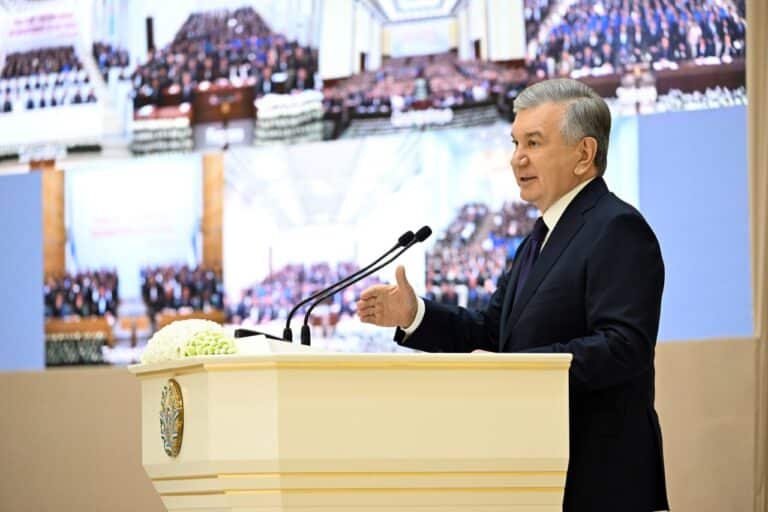
As Uzbekistan accelerates reforms and opens new sectors to investors, IFC remains deeply engaged. In this exclusive interview, Wiebke Schloemer, IFC Regional Director, outlines how the World Bank Group’s private sector arm is supporting the country’s development — from banking and agriculture to energy and water.
— Over the past few years, Uzbekistan has undergone significant economic and social developments. In your opinion, which key developments stand out and deserve special mention?
— Uzbekistan has implemented bold reforms since 2017 to liberalize its economy and improve prospects for private sector development. With average annual GDP growth of 5.3%, the country is one of the world’s top reformers and outperforms many lower-middle-income economies.
The government has significantly improved the investment climate through an ambitious reform program focused on enhancing the country’s investment competitiveness. Key reforms include liberalizing foreign exchange, streamlining business enabling environment, and opening new sectors for private sector participation.
Over the past two years, wide-ranging political, institutional, and legal measures have targeted competitiveness, performance, and profitability in agricultural, transport, chemical, and energy sectors. For example, the government has established an independent energy regulator – the Agency for the Development and Regulation of the Energy Market – and initiated long-awaited energy tariff reform. It has also restructured the state-owned railway operator (JSC «Ozbekiston Temir Yollari»), privatized a large chemical plant (JSC «Ferganaazot») and a bank (Ipoteka-Bank), and unbundled the leading chemical state-owned enterprise (JSC «Uzkimyosanoat») to open markets for competition.
At IFC, we welcome these reforms and remain committed to expanding our investments and advisory services. As a member of the World Bank Group, IFC aims to harness the power of the private sector to help end poverty and create opportunities in Uzbekistan.
— Continuing those reforms, how can the government of Uzbekistan better support development of private sector?
— In meetings with our state partners, we acknowledge the progress made so far, but we also encourage them to advance essential reforms in key sectors to foster a more competitive private sector. This includes reducing the state’s role in the economy by further restructuring and privatizing state-owned enterprises (SOEs) and state-owned banks (SOBs) and ensuring a level playing field for all market participants. Telecommunications and financial services, in particular, require further liberalization, and reforms here could be accelerated.
Reducing state control over the economy in favor of market and commercializing SOEs will improve resource allocation and boost private sector growth, including in agriculture, chemicals, energy, and transport. This will also allow for greater private sector participation. Improving access to finance for smaller enterprises is critical to support private sector growth.
Access to skilled labor is another significant constraint for businesses. This stems from gaps in the quality of general education and limited higher education and professional training opportunities. The private sector is crucial for job creation, especially in Uzbekistan, as its population is rapidly increasing.
According to the World Bank’s data, job creation has lagged, with just 1.1% average growth over the last five years, while population growth averaged 2% over the same period. This has resulted in an estimated net increase of 250,000 people entering the working-age population each year.
The World Bank Group puts jobs at the center of its mission. Quality jobs are central to development—they reduce poverty, build human capital, and foster social cohesion. In Uzbekistan, we are supporting local business-led projects aimed at achieving this goal.
— Currently, one of the main topics on the agenda of the government of Uzbekistan is accelerating economic growth and attracting foreign direct investment (FDI). In your opinion, which sectors of the economy can play a major role in achieving this goal and should be a priority?
— Agriculture is a vital sector with significant potential for growth and productivity improvements. The country is transitioning from a state-led agricultural system focused on cotton and wheat to a more diversified, private sector-driven approach. Horticulture, in particular, has substantial job creation potential. It generates a large share of crop value and agricultural output from a relatively small area of arable land.
The banking sector offers unique investment opportunities for FDI investors through the ongoing privatization of SOBs. The government has focused its efforts on the finance sector, aiming to bring private banks’ asset shares to 60% and their deposit shares to 70% by 2025. IFC supported the modernization of Ipoteka Bank, which allowed for its successful privatization by a foreign investor and is working with two other SOBs to help transform them into commercially viable institutions in preparation for privatization.
The energy sector plays a crucial role in Uzbekistan’s economy. IFC and other financial development institutions have already helped Uzbekistan attract interest from foreign investors like ACWA Power and Masdar in renewable energy. The government’s proactive approach in enhancing regulatory frameworks, coupled with the country’s natural resources, makes Uzbekistan an attractive destination for energy investments.
Uzbekistan’s IT sector and the development of data centers offer substantial opportunities for FDI, supported by strategic initiatives and ongoing reforms. While challenges such as limited broadband coverage and skilled labor shortages exist, the government’s commitment to improving digital infrastructure and increasing private sector participation is likely to enhance interest from foreign investors. Continued efforts to address these challenges will be crucial to realize the full potential of FDI in this sector.
Uzbekistan’s tourism sector is well-positioned to contribute to employment generation and economic diversification. However, it must first face challenges like limited transport connectivity, inadequate hospitality infrastructure, and a shortage of skilled workers.
— You participated in the plenary session of the Foreign Investors Council. What is the main goal of the council? What issues did you raise during the session?
— The Foreign Investors Council, chaired by the President of Uzbekistan, plays a critical role in improving the investment climate. The President’s commitment to strengthening the country’s investment environment is commendable, and ongoing efforts to enhance the Council’s effectiveness are equally encouraging.
We applaud Uzbekistan’s dedication to liberalizing key sectors, advancing privatization, and transforming state-owned enterprises. These initiatives are essential for mobilizing private capital and laying the groundwork for sustainable economic development. To further strengthen the investment climate, we encourage the swift adoption of the new Law on Special Economic Zones, the Capital Market Law, and the Law on Alternative Investment Funds. These legislative advancements will attract more investors and foster a dynamic economic environment.
Uzbekistan’s success in implementing public-private partnerships (PPPs) in the energy sector provides invaluable insights. These can be leveraged to accelerate infrastructure development in other critical sectors such as water, transport, healthcare, and education. In addition, amending the Electricity Law and other legislative acts to enable private sector involvement in power distribution and permit the transfer of asset usage rights within PPP projects will be instrumental in driving progress. Revising the Law on Public-Private Partnership to allow for contract terminations without Cabinet of Ministers’ approval, and introducing protections against legislative changes that impact project taxation, will further bolster investor confidence.
— Can you tell us about IFC’s current operations and plans going forward?
— As of June 2025, IFC’s total committed investments in Uzbekistan exceed $900 million. Our portfolio covers the energy and financial sectors, food and beverage processing, and retail. Infrastructure investments alone total $500 million, supporting solar, wind, and gas-fired power generation, and energy storage projects. We also provide financing to local financial institutions to support smaller and women-owned businesses, housing, and climate finance projects. In addition, we have projects in manufacturing, agribusiness, and services sectors. Going forward, IFC plans to diversify investments into sectors like water supply and wastewater treatment, transportation, tourism, and real estate.
In addition to its investment operations, IFC implements an extensive advisory program to unlock new markets for private sector investment. IFC’s large PPP program aims to attract private capital to critical sectors such as energy generation and distribution, healthcare, education, transportation, and irrigation sectors.
Given that Uzbekistan and the broader Central Asian region are already water-stressed, we aim to support improvements in service delivery, operational efficiency, and infrastructure development within this critical sector.
We are also advising the government on comprehensive legal and regulatory reforms to improve the investment climate. This includes the development of the new Investment Law, Capital Market law, and the Law on Special Economic Zones, as well as efforts to establish the necessary ecosystem for private equity and venture capital through the development of the Law on Alternative Investment Funds. IFC is also helping to create markets for networked geothermal energy solutions, green buildings, and e-mobility. In addition, we are working to improve access to finance for SMEs through asset-based financing.
As Uzbekistan moves forward, IFC remains a committed partner in helping unlock the potential of the private sector for inclusive, sustainable growth.













